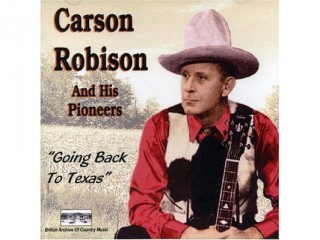
Carson Robison biography
Date of birth : 1890-08-04
Date of death : 1957-03-24
Birthplace : Oswego, Kansas, USA
Nationality : American
Category : Arts and Entertainment
Last modified : 2011-03-09
Credited as : Country music singer, and songwriter,
0 votes so far
Carson Robison, known in some circles as "the granddaddy of the hillbillies," has mysteriously missed the recognition that has come the way of such contemporaries as Vernon Dalhart, not to mention successors such as Gene Autry and Merle Travis. A singer, guitarist, whistler, and actor, the sheer diversity of his talent, coupled with the relatively early beginning of his recording career, may have harmed him in terms of posterity.
Robison's father was a champion fiddler, while his mother was a singer and pianist, and by the time he was 14 years old, he was already playing guitar professionally. A year later he was playing in bands and singing and by his twenties was proficient on a range of instruments as well as an accomplished whistler. It was in the latter capacity that Robison first came into the recording studio, as part of backing groups behind Dalhart and Wendell Hall. Ultimately he teamed with Dalhart, and the two recorded and toured together from 1924 until 1928. Robison also worked with the Crowe Brothers and co-wrote songs with Frank Luther Crowe ("My Blue Ridge Mountain Home," "Barnacle Bill the Sailor"). Other artists with whom Robison performed and recorded include singers Gene Austin and Frank Crumit and guitarist Roy Smeck.
In 1931, Robison formed his own group, the Pioneers, later rechristened the Buckaroos, which included John and Bill Mitchell, Frank Novak, and Pearl Pickens. The first country & western group to tour England, they had a considerable recording and broadcast career abroad as well as in America before World War II. Robison had a hit in 1942 with the old standard "Turkey in the Straw" and wrote songs on behalf of the war effort, including "We're Gonna Have to Slap That Dirty Little Jap." As late as 1948, he had a chart entry with "Life Gits Tee-Jus, Don't It?" and the year before his death, he recorded the novelty rock & roll number "Rockin' and Rollin' With Grandmaw."
A fine technician as well as a good judge of songs, Robison was perhaps too sophisticated to be grouped with hillbilly singers, cowboy singers, or country music in general. His music had a veneer of pop sophistication that, in some ways, made it at times closer in spirit to Bing Crosby or even Eddie Cantor (check out "Everybody's Goin' but Me") than to Autry, while also lacking the honest directness (as well as the extraordinary harmonies) of the Sons of the Pioneers. Under other circumstances, he might've made a name in movies providing musical backgrounds, but media exposure beyond the radio eluded him.
















